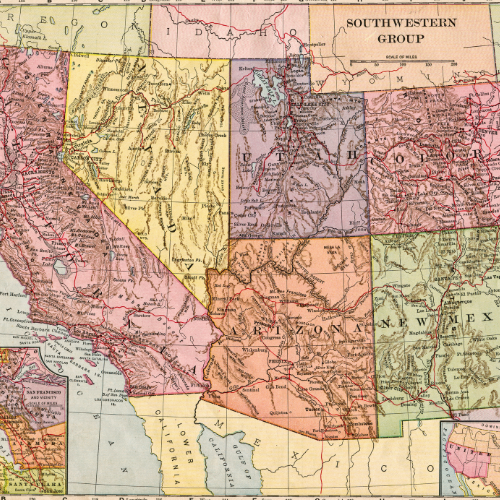RECA Expired One Year Ago—What it Means, and Why it Matters

June 10, 2025
Today, June 10, 2025, marks one year since the Radiation Exposure Compensation Act (RECA) expired. To raise awareness for this anniversary, we’ve gathered information from advocates and partners to share what RECA is, why it matters, and the impacts of RECA’s expiration.
What is RECA?
The Radiation Exposure Compensation Act (RECA), established in 1990, provides financial compensation to those harmed by radiation from U.S. nuclear weapons testing and uranium activities. RECA emerged from decades of activism and advocacy by affected communities, such as the Sovereign Nations of the Pueblo and Navajo, who were disproportionately impacted by uranium mining, and downwind communities in New Mexico, Utah, and Arizona.
What impacts are experienced by communities compensated by RECA?
These communities continue to deal with cancers and other health issues from radioactive fallout decades later. Numerous other communities continue to be affected by nuclear contamination not covered under RECA. Advocates have been pushing for the expansion of the act to cover more geographic areas.
For example, in the St. Louis area of Missouri, residents were unknowingly living near nuclear dump sites created during the Manhattan Project and continue to suffer from health consequences.
“In my hometown of St. Louis, Missouri, there are hundreds of known radioactive hotspots that contaminate our soil and waterways. These hotspots affect private homes and businesses, as well as public schools and parks,” says Christen Commuso, Policy Specialist at the Missouri Coalition for the Environment in St. Louis. “I am a cancer survivor linked to radiation exposure, and I have had to ration my medical care simply because I cannot afford it. Now, my father has been diagnosed with stage 4 lung cancer (despite being a nonsmoker) that has spread to his brain. We are literally fighting for our lives.”
What are the consequences of RECA expiring?
RECA was set to expire on June 10, 2024, and crucially, the program was expected to be reauthorized, as it was recognized as critical to addressing those impacted by radiation exposure. This would have been a significant instance of the government righting a wrong done to a swath of its people. Despite bipartisan support in the Senate, which passed it 69-30 in March 2024, the RECA bill was never brought to the House floor for a vote. An attempt was made to re-introduce RECA authorization in January 2025, but ultimately to no avail.
Since the program expired, affected communities and individuals are left without help. Uranium miners, who worked underground in dangerous conditions in the name of national security, and downwinders (individuals who were exposed to radioactive fallout from nuclear testing), suffer from illness and die every year from these biological and physiological effects.
“Here we are a year after RECA officially expired and 80 years after the detonation of the first atomic bomb, and communities throughout the West and beyond are still waiting for justice for the devastating losses we’ve suffered as a result of four decades of nuclear weapons production and testing on our own soil,” says Mary Dickson, a Utah Downwinder. “It’s time that Congress finally do the right thing, not just by reauthorizing RECA but by expanding it to include more of us who have paid the terrible price of the Cold War Arms Race.”
Commuso echoed this sentiment: “Our right to life, liberty, and the pursuit of happiness have been stripped from us in the name of national security. We deserve better; we demand better. RECA must be reauthorized and expanded to include our forgotten communities before more of us die.”
What comes next for RECA and its advocates?
Today, many in our field call on Congress to pass comprehensive legislation to reauthorize and strengthen RECA by including impacted communities across the country. Ploughshares Content Creator, MacKenzie Cordova, wrote a piece earlier this year about her home state of New Mexico and the persisting impacts of nuclear fallout.
“Mother New Mexico would never forget this pain though. How could she? Her womb was left blackened and scorched, and her children after bore her scars … She watched helplessly as they grew sicker and died younger. How could her Sun do this?”
Cordova’s words paint a beautiful yet harrowing picture of the lasting “scars” in her community—and many others—that are present even today. Generational and field activists continue to push for RECA re-introduction and reform, and today’s one-year expiration anniversary is a reminder of how coalition building continues to push U.S. government and changemakers in a direction of justice and reparation.
Additional reading from our grantees and content creators:
- “Radiation exposure victims fight for compensation as nuclear weapons funding soars,” Bulletin of the Atomic Scientists (Chloe Shrager, March 2025)
- “Mother New Mexico,” Ploughshares Story Center (MacKenzie Cordova, February 2025)
- “A last push for RECA as sunset looms,” Nuclear Watch New Mexico (Alicia Inez Guzmán, May 2024)
This post was written with support from Kiran Obee.
